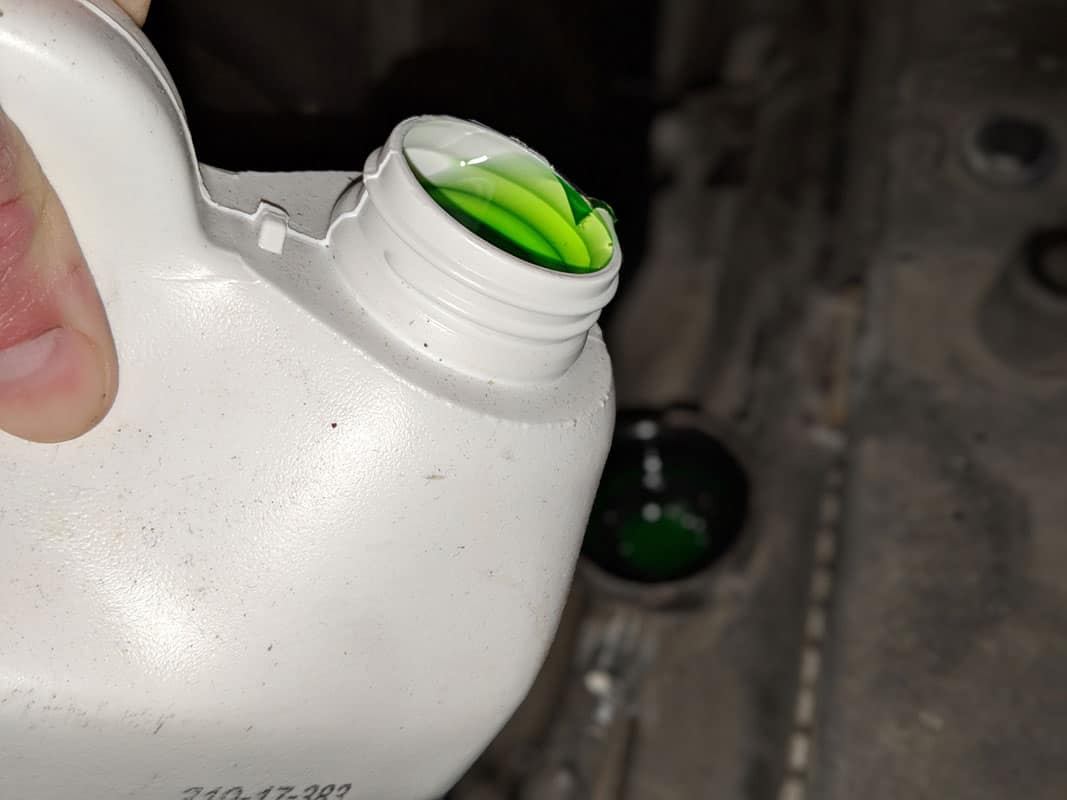Table of Contents
Why Is My Car Overheating And Losing Power?
If your car is currently overheating way faster than it normally does this article will explain what can cause that to happen and what you can do to fix it. You may be asking why is my car overheating so fast? Well, it depends on what part of your coolant system is malfunctioning. If you are lucky your car just may be low on coolant.
Common Causes of Overheating
1. Your Engine Coolant Level is Low
If your engine is overheating you would first want to check your coolant levels to make sure they are within range of where they need to be. If you pop your hood and look in your engine bay you should see a coolant reservoir.
That coolant reservoir should have a marker telling you what a low amount of coolant and a marker that tells you where to stop filling coolant at. If your coolant levels are not to the low marker then you would want to add more coolant to your coolant reservoir.
2. You Have a Coolant Leak
If you have a leak in one of your coolant hoses this can eventually cause your engine to overheat. If your coolant system does not have enough coolant in the system your coolant system won’t be able to effectively cool down your engine. If your coolant system can’t cool down your engine this can lead to it overheating.
You would want to check your coolant levels to make sure that they are where they need to be and if they are low you would want to go ahead and add more coolant. If you’d like to order some engine coolant from Amazon click this link to check current prices.
3. Your Thermostat Needs Replaced
If your thermostat on your vehicle is not working properly it will not allow your coolant system to work as it should. Your thermostat is a valve within your coolant system that senses the temperature of the engine and then either opens or closes based on the current temperature.
Over time your thermostat can get stuck open or closed which can cause your coolant system to not work properly. If your thermostat gets stuck open then your coolant system will be running all the time and it will take your engine a long time to get up to operating temperature.
If your engine is overheating it’s more likely that your thermostat is stuck in the closed position. If your thermostat gets stuck closed this means that it won’t let any coolant from the radiator pass through your engine to help cool it off.
If your thermostat is stuck in either the closed or open position it will need to be replaced with a new thermostat. Once your thermostat is replaced your coolant system should function like normal again.
4. Your Water Pump Needs To Be Replaced
Your water pump is in charge of circulating coolant through your coolant system. If your water pump is broken then it won’t be able to do its job and your coolant will sit stagnant not actually circulating coolant throughout your engine.
On some water pumps, they are made with plastic fan blades which can crack and break off. If one fan blade breaks it may not be that big of a deal but it would reduce your cooling capacity. If this happens to you then you will likely need to replace your water pump down the line.
5. Radiator Issues
If your radiator is having problems being able to pass the coolant through it to cool it down this can also cause your engine to overheat. Your radiator is in charge of cooling down your coolant by forcing it through tiny passageways that have outside air passing around them to lower the temperature of the coolant.
Over time your radiator may get clogged or it may be cracked preventing it from being able to do its job. If this is the case on your car you may need to replace your radiator with a new one.
6. You Are Overloading Your Engine
If you are towing a heavy payload or are tracking your car you may find that your engine will overheat from time to time. Under heavy loads, your engine will be working harder and hitting higher RPMs which will increase the temperature inside of your engine.
If you know that you are going to be towing heavy loads it’s best to do it in a car or truck that can handle the weight capacity that you are trying to tow. Don’t try to tow a 24-foot trailer with an SUV designed to tow 3 thousand pounds.
What To Do If Your Car Overheats
1. Turn Off Your Air Conditioner and Power Accessories
If your car is starting to overheat you would want to reduce as much load on the engine as possible. If you currently have your air conditioner running you would want to go ahead and turn that off and roll down your windows.
You would also want to turn off or unplug any other accessories that may be using electricity from your car. Your car has to produce that electricity to power your electronics and accessories in the car and that power will come from your engine. If you have anything plugged in you would want to unplug or turn off anything that may be draining electricity from your vehicle.
2. Turn On Your Heater
If your car is still not going back to normal operating temperatures after you turn off your air conditioner and all accessories you would next want to turn on your heater. Turning on your heater may not be comfortable if it is hot outside but pumping that air into your cabin will cool down your engine in the process.
If it is hot outside you would want to roll down your windows so that you are getting some fresh air. You would want to turn on your blower on full power so that it is pumping as much hot air as possible away from your engine.
3. Maintain Speed
Your car’s coolant system is designed to cool your engine by passing air through the radiator to lower the temperature of the coolant. If you are stuck in stop and go traffic then your car may not have enough air flowing through the radiator to be able to effectively lower the temperatures of the coolant inside.
You would want to try if possible to maintain a specific speed and not come to a full stop as if you come to a stop no air will be flowing through your radiator. If you are stuck in traffic and not able to move you may need to pull to the side of the road to give your car a chance to cool down.
4. Pull Over
If none of these steps helps cool down your engine temperatures you would likely want to pull over to prevent damaging your engine. If your coolant gets too hot it can also start to boil at certain temperatures.
If after an extended period of time your engine is still not going back to normal levels you should pull to the side of the road to let it cool down. Once it has had a bit of time to cool back down then you can resume driving to your destination.
What to do When Your Car Overheats and Shuts Off
If your car has been overheating and then shuts off because of the overheating problem you would want to safely pull to the side of the road so that you can come to a stop to see what is going on. When you come to the stop on the side of the road hopefully you are in an area where you can inspect your vehicle.
If you are on the side of the road where it is very busy then you may want to just wait inside your car until it has had a chance to cool off to try starting it again. If you have some room to get out and inspect your vehicle you would want to pop your hood to first check your coolant levels.
If your coolant levels are low and you have some water in the car with you it will work in a pinch but you would want to ideally use coolant with antifreeze in it to prevent it from freezing up in the winter.
Why Is My Car Overheating And Losing Power?
If your car is overheating and losing power then there is likely something wrong with one of the items I mentioned above. Losing power and overheating are tied together. Overheating can cause your engine to lose power because it is not operating to its full potential.
If your engine is stressed out from overheating this can cause power loss. The good news is that your engine should regain it’s full power once you are able to cool it back down again.
Why Is My Car Overheating? – In Conclusion
Now you know what you should do if you ever are driving along and your car starts to overheat. If you are stuck in traffic you may need to pull to the side of the road to let your engine cool down.
You would also want to check your coolant levels to make sure that they are within the range specified by your vehicle manufacturer. If you notice oil in your coolant while you are checking your coolant levels I’d recommend reading my other article about what to do if you find oil in your coolant.

